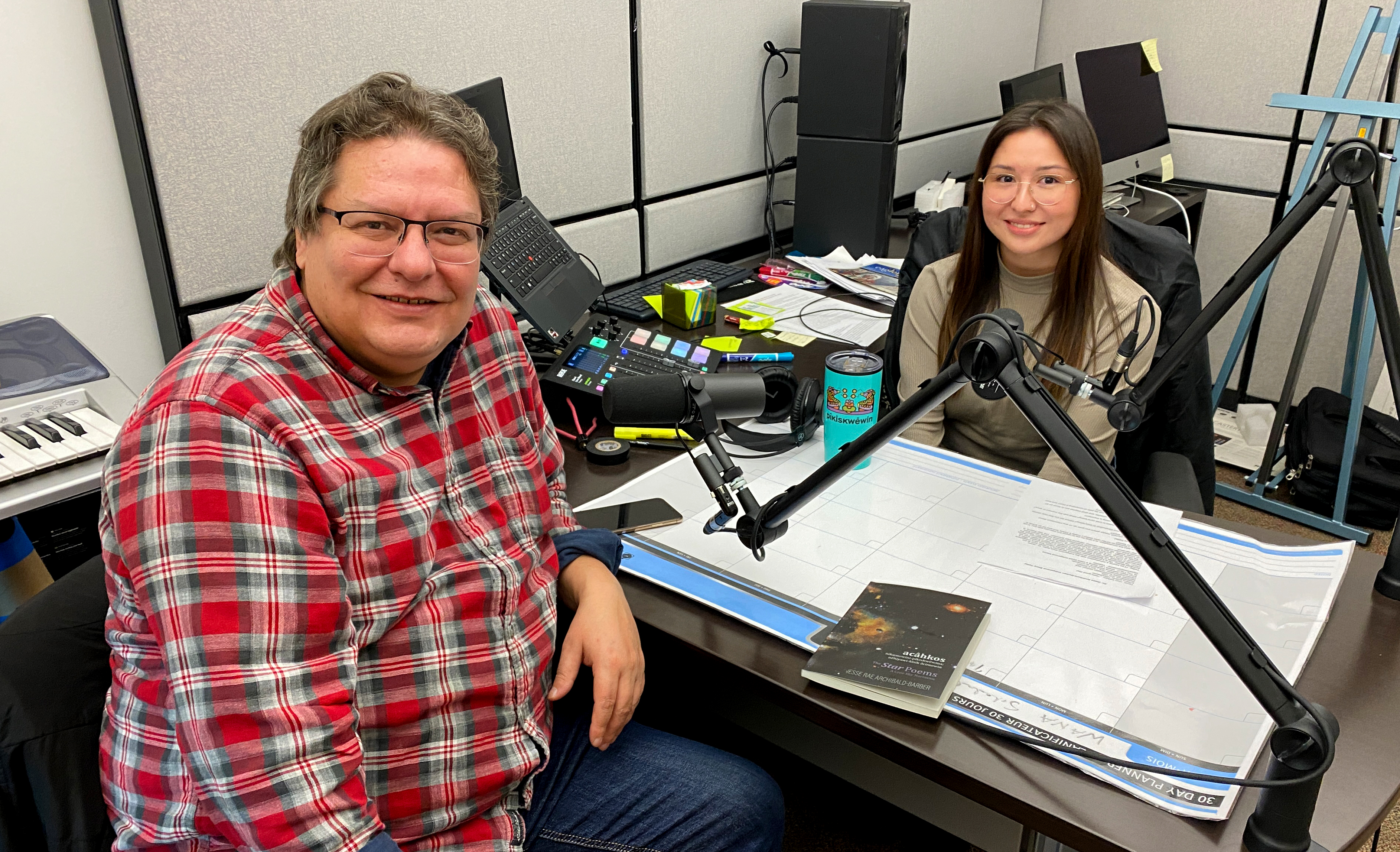
By Crystal St.Pierre, Windspeaker Buffalo Spirit Reporter
Sharing knowledge and culture to restore language is the focus of pîkiskwêwin.
It’s an online podcast platform for listeners who want to learn language while also hearing stories about the stars, Métis cooking, or Elder wisdom.
“Language is important because language is rooted in our culture, our identity, our place on this land,” said podcast producer and host Lidell Haywahe.
“Language is everything when it comes to defining who we are as people. Learning their language is one of the biggest things that people need to do in order to renew themselves with their culture.”
The pîkiskwêwin project is funded through the Government of Canada.
The project is headquartered at the First Nations University of Canada (FNUC). It launched in 2021 with a two-year funding initiative from the Canadian Heritage program.
The project produces podcasts in the Indigenous languages in Saskatchewan, including Cree, Saulteaux, Dakota, Lakota, Nakota, and Michif. FNUC is located in that province. With funding renewal, pîkiskwêwin hopes to develop podcasts beyond those borders.
Pîkiskwêwin founder Shannon Avison said she got the idea for the platform following a call out for proposals from Canadian Heritage for projects related to Indigenous languages.
“I had looked and saw that there were lots of podcasts, more and more about Indigenous things, and even about Indigenous languages, but very few were in the languages, like actually people speaking, speaking the languages they talked about. They talked about the language, they talked about language retention and language revitalization, but they weren’t in the language,” Avison said.
“I understood the need. I understood the opportunity and I understood podcasting and so I understood that there was a gap and that there was an opportunity to provide a space and a way on a variety of platforms of listening to the language,” she added.
Avison, an associate professor of Indigenous Communication and Fine Arts at FNUC, chose the name pîkiskwêwin based on it’s Cree meaning that encompasses language as a whole.
“It means Mandarin, English, Spanish… Like it just means language for every culture in every nation… It is the source of all knowledge and the source of all understanding,” Avison said.
The recent announcement of an additional year of extended funding and the possibility of four more after that will enable pîkiskwêwin to spread its wings and include more podcasts and, ultimately, languages from across Canada.
“With the extra funding that pîkiskwêwin got this year it creates an opportunity for more people who want to learn their language to reclaim their identity through their language and, you know, initially we’re concentrated on Saskatchewan and the languages that we have here, but the funding will help us to reach more communities and help more languages,” said Haywahe.
“If you go to the pîkiskwêwin website, you'll see that there are dozens of different podcasts,” said Avison.
Some of the hosts include Robert Merasty, whose podcast is titled Centennial Child. In episode 1, he has guest Gary Tinker share memories from his childhood growing up as one of 15 children in Pinehouse, Northern Saskatchewan and his placement in southern foster homes.
Jesse Rae Archibald Barber hosts Cree Star Stories. He shares his poems inspired by the traditional stories about the origins of the constellations and spiritual connections to the land and cosmos.
Métis hosts Alex and Beatrice Pelletier have a podcast called MawMaw Sachweezin – Mom’s Kitchen Métis Cooking Show where they share Métis recipes and stories.
Another podcast called Solsquatch Speaks has Cree knowledge keeper Solomon Ratt and his student Darian Agecoutay speak about customs, traditions, spirituality, kinship and language.

Haywahe, a member of Carry the Kettle Nakoda Nation in Saskatchewan and graduate of FNUC, has been working with the pîkiskwêwin project for the past year and is excited about the opportunities the renewed funding will provide.
During the past year she has worked on creating podcasts behind the scenes and as a host. The new funding has provided her role to expand to technical and content producer for pîkiskwêwin.
“By expanding our breadth of languages… (it will) allow people a further reach to have access to their languages. It’s almost like we’re growing the roots of our tree because you know our foundation is growing,” said Haywahe. “It’s just a beautiful opportunity for people to learn their language, not only just in Saskatchewan but in all of the provinces of this country.”
Having the podcasts through multiple listening platforms allows the content to reach listeners whether they are living in urban centres or remote areas.
“When we talk about all the displaced people who are living in the cities, a lot of times they’re displaced from their own land and their languages… Really what pîkiskwêwin does is it gives every listener the opportunity to hear their language, their mother tongue and then that might give them the help to restore that sense of identity,” Haywahe said.
Anyone who is interested in sharing their stories and language is encouraged to contact pîkiskwêwin about their ideas and the potential for hosting a new podcast.
Go to www.Pîkiskwêwin.ca for more information.
Top Photo: Podcaster Jesse Rae Archibald Barber is interviewed by pîkiskwêwin trainee Brittany Poitras.
